Belarus Tour Guide: Ideas for Your Trip!
What to See in Minsk: Top Attractions

Victory Square
The Minsk guide will help you plan your trip to the Belarusian capital and map must-see places to suit your taste. We offer a collection of architectural, cultural, religious and sports attractions.
ARCHITECTURE
Independence Avenue (Prospect Nezavisimosti)
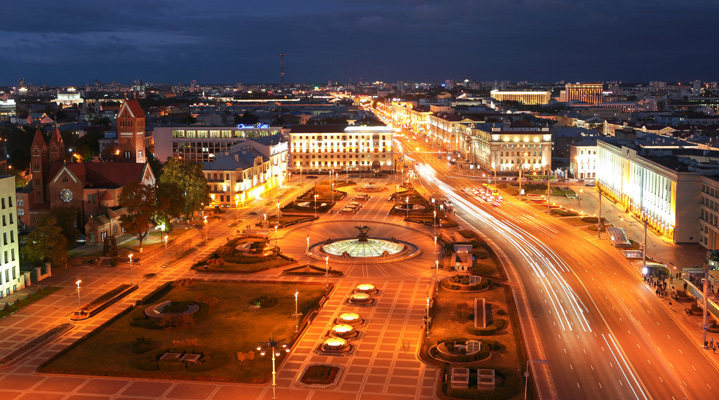 The 15-kilometer Independence Avenue is the main thoroughfare of the city. It stands out for the integrity of the post-war architecture ensemble (Stalinist Empire style) and is up for nomination to the UNESCO World Heritage list.
The 15-kilometer Independence Avenue is the main thoroughfare of the city. It stands out for the integrity of the post-war architecture ensemble (Stalinist Empire style) and is up for nomination to the UNESCO World Heritage list.
Several must-see places are located along Independence Avenue: Independence Square (7 hectares of ‘architectural impressions’ designed by the famous Iosif Langbard), Okyabrskaya Square with a zero-kilometer sign, Victory Square (an oval square with a nearly 40-meter obelisk banded with the inscription “Feat of People is Immortal”) and Yakub Kolas Square with the monument to the national poet.
Gate of Minsk
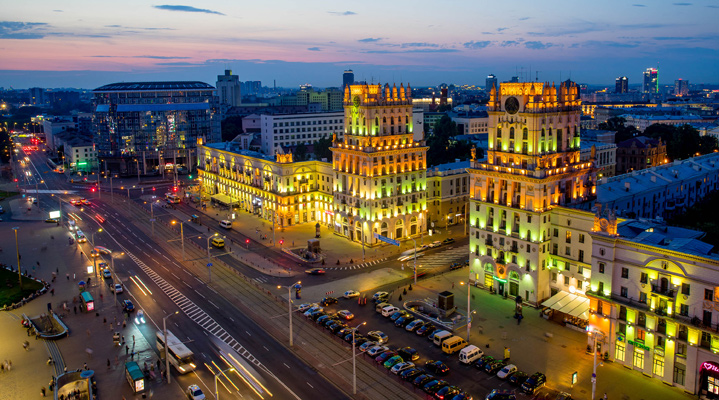 Gate of Minsk is the first thing you see when you arrive in the city by rail. The brand, the calling card, a meeting place and a reference point, the place with two towers... It can be called “a small crown” of the city because the life never stops here for a minute.
Gate of Minsk is the first thing you see when you arrive in the city by rail. The brand, the calling card, a meeting place and a reference point, the place with two towers... It can be called “a small crown” of the city because the life never stops here for a minute.
Upper Town
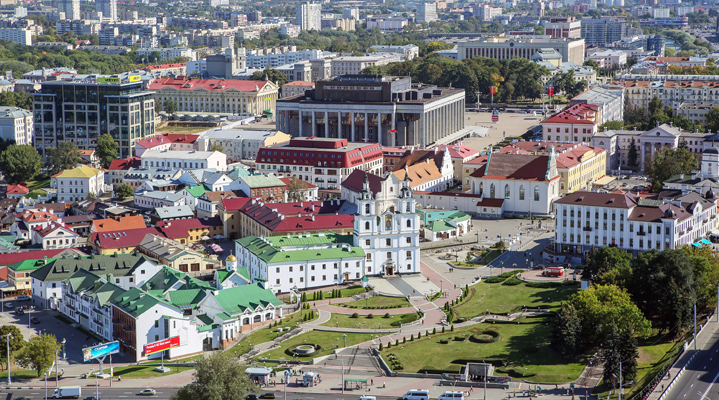 The Upper Town is the historic center of Minsk, an ideal place for a stroll, aesthetic and gastronomic pleasure. After a tour along the streets of the old Minsk (the Town Hall, the former shopping arcade, Basilian monastery, Jesuit College, “House of Masons”, the Virgin Mary Cathedral, d’ Europe Hotel and the Vankovich manor house) you can walk down to the Svisloch River along Zybitskaya Street, the buzz of the city nightlife.
The Upper Town is the historic center of Minsk, an ideal place for a stroll, aesthetic and gastronomic pleasure. After a tour along the streets of the old Minsk (the Town Hall, the former shopping arcade, Basilian monastery, Jesuit College, “House of Masons”, the Virgin Mary Cathedral, d’ Europe Hotel and the Vankovich manor house) you can walk down to the Svisloch River along Zybitskaya Street, the buzz of the city nightlife.
Trinity Suburb
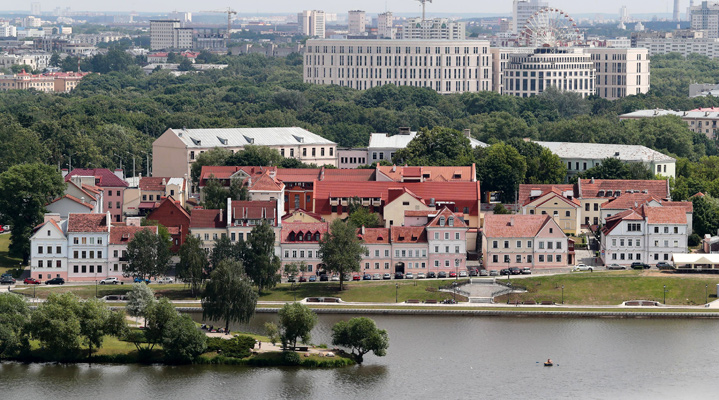 With its bright facades of houses with tiled roofs and attics, cozy yards, labyrinths of old cobbled streets, Trinity Suburb can be named Minsk’s corner of coziness and warmth. Another nearby attraction is the Island of Tears.
With its bright facades of houses with tiled roofs and attics, cozy yards, labyrinths of old cobbled streets, Trinity Suburb can be named Minsk’s corner of coziness and warmth. Another nearby attraction is the Island of Tears.
CULTURAL LIFE
Bolshoi Opera and Ballet Theater
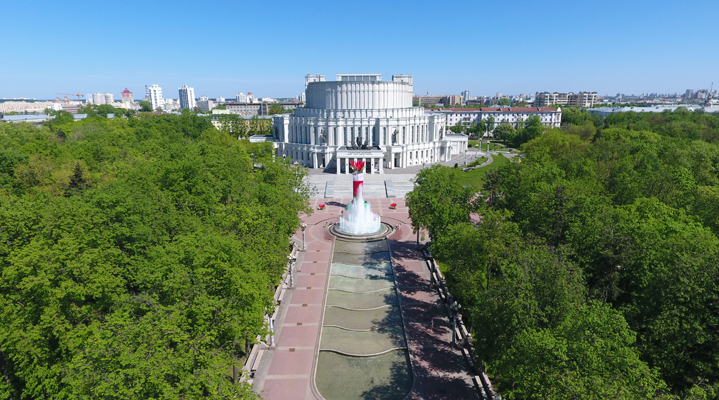 Founded 85 years ago, the famous Bolshoi offers the immortal classics and contemporary opera and ballet productions. Every year the theater opens its doors to anyone wishing to see the backstage, try their hand at acting and even see a performance on the roof.
Founded 85 years ago, the famous Bolshoi offers the immortal classics and contemporary opera and ballet productions. Every year the theater opens its doors to anyone wishing to see the backstage, try their hand at acting and even see a performance on the roof.
National Library of Belarus
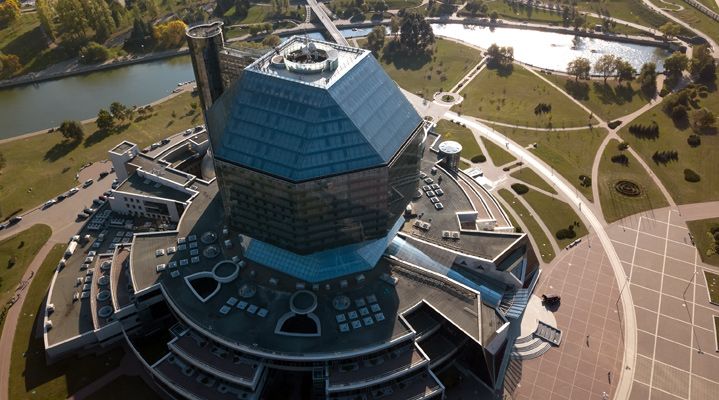 The National Library of Belarus has been named one of the world’s 50 most unusual buildings according to the Village of Joy website. It has been mentioned in the fantastic architectural works ranking by the US edition Flavorwire and the book “100 Most Surprising Achievements of Modern Architecture”. The library has 23 floors and an observation deck at the height of 73 meters. Its collection numbers 9 million copies. At night the library is lit in stunning fashion by 4,646 color-changing RGB LED fixtures.
The National Library of Belarus has been named one of the world’s 50 most unusual buildings according to the Village of Joy website. It has been mentioned in the fantastic architectural works ranking by the US edition Flavorwire and the book “100 Most Surprising Achievements of Modern Architecture”. The library has 23 floors and an observation deck at the height of 73 meters. Its collection numbers 9 million copies. At night the library is lit in stunning fashion by 4,646 color-changing RGB LED fixtures.
National Art Museum
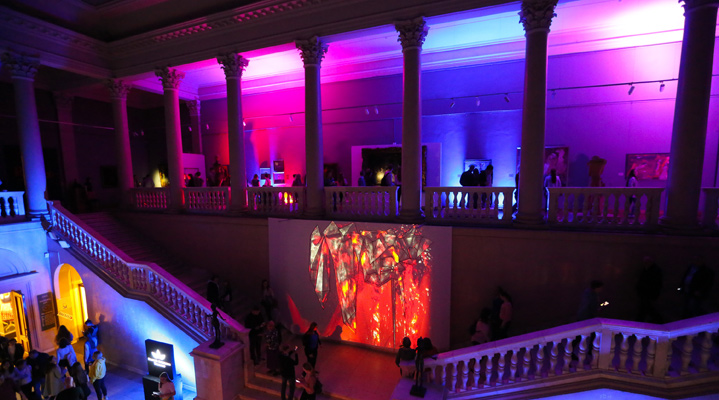 National Art Museum is more than just exhibition halls with original works by famous painters on display. The museum is trying to redefine the role of art museums by complementing the art space with interactive exhibitions, educational programs, master classes, performances and concerts. Two times a year the museum opens its doors after the sunset – for the Museum Night and the September Night events.
National Art Museum is more than just exhibition halls with original works by famous painters on display. The museum is trying to redefine the role of art museums by complementing the art space with interactive exhibitions, educational programs, master classes, performances and concerts. Two times a year the museum opens its doors after the sunset – for the Museum Night and the September Night events.
Great Patriotic War Museum
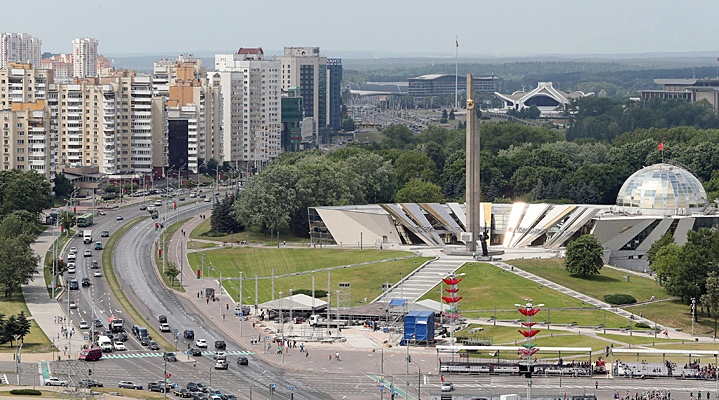 It is Belarus’ most visited museum and the world’s first museum dedicated to the Great Patriotic War. The story of the war is told using the language of modern technology, with spherical screens, holograms, 3D installations. Apart from iterative expositions, visitors are invited to take part in military history reenactment of key events of WW2.
It is Belarus’ most visited museum and the world’s first museum dedicated to the Great Patriotic War. The story of the war is told using the language of modern technology, with spherical screens, holograms, 3D installations. Apart from iterative expositions, visitors are invited to take part in military history reenactment of key events of WW2.
Belarusian State Philharmonic Society
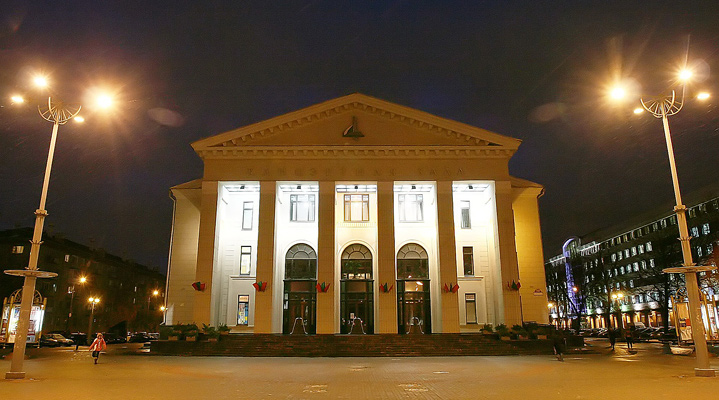 The Belarusian State Philharmonic Society is the place where the legendary Pesnyary frontman Vladimir Mulyavin rose to stardom (it was here where the Lyavony band was created to be later renamed into Pesnyary). Every year the philharmonic society gives hundreds of concerts featuring best musicians from Belarus and the world. Apart from that, the philharmonic society is the central venue for the famous Yuri Bashmet International Music Festival.
The Belarusian State Philharmonic Society is the place where the legendary Pesnyary frontman Vladimir Mulyavin rose to stardom (it was here where the Lyavony band was created to be later renamed into Pesnyary). Every year the philharmonic society gives hundreds of concerts featuring best musicians from Belarus and the world. Apart from that, the philharmonic society is the central venue for the famous Yuri Bashmet International Music Festival.
Belarusian State Circus
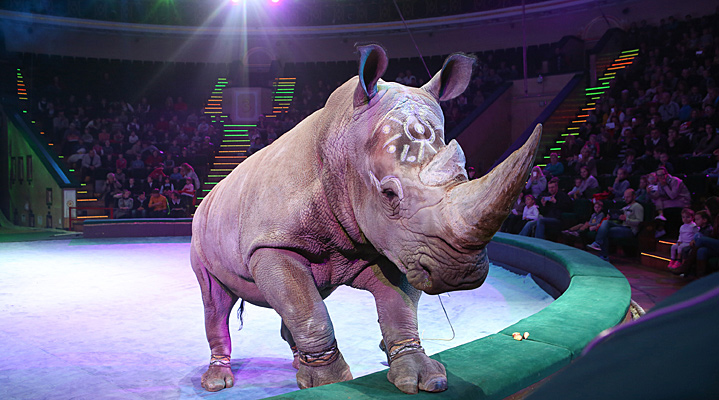 The USSR’s first permanent winter circus opened in Minsk in 1959. The circus often welcomed world-famous artists, while Belarusian clowns, gymnasts, acrobats and animal tamers won countless international awards. Today the Belarusian State Circus is considered to be one of the best in Europe and the world.
The USSR’s first permanent winter circus opened in Minsk in 1959. The circus often welcomed world-famous artists, while Belarusian clowns, gymnasts, acrobats and animal tamers won countless international awards. Today the Belarusian State Circus is considered to be one of the best in Europe and the world.
Oktyabrskaya Street
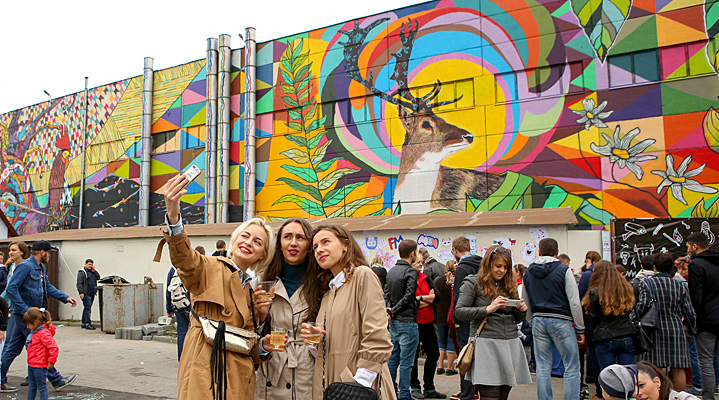 The street that used to be packed with industrial enterprises has reinvented itself as a showcase for modern street art. Due to the Vulica Brasil street art festival, gloomy factory walls turned into flamboyant murals. Tourists and local residents are attracted by its thriving art and culture scene that incorporates a cultural hub, art venues, bars, cafes, a hotel and numerous festivals amidst original street art works.
The street that used to be packed with industrial enterprises has reinvented itself as a showcase for modern street art. Due to the Vulica Brasil street art festival, gloomy factory walls turned into flamboyant murals. Tourists and local residents are attracted by its thriving art and culture scene that incorporates a cultural hub, art venues, bars, cafes, a hotel and numerous festivals amidst original street art works.
PARKS AND GREEN SPACES
Gorky Park
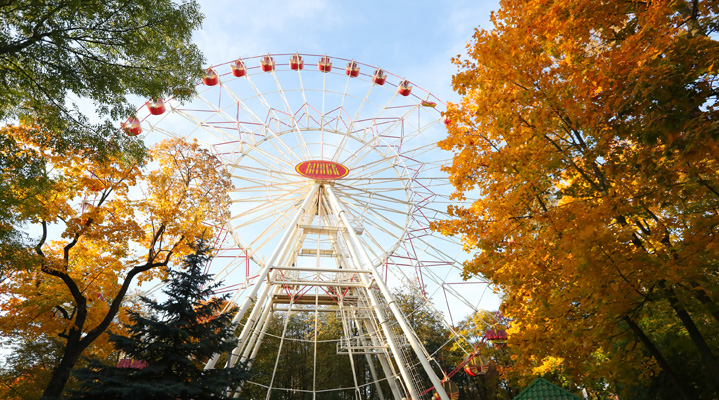 If you want to get a bird’s-eye view of the city from a Ferris wheel, see stars during daytime in a planetarium, and a heap of snow in the summer (near the training ground of the HC Yunost-Minsk), you should include the Gorky Park in your itinerary. Previously known as the Governor’s Garden, it was Eastern Europe’s first public garden planted on the bank of the Svisloch River in the early 19th century.
If you want to get a bird’s-eye view of the city from a Ferris wheel, see stars during daytime in a planetarium, and a heap of snow in the summer (near the training ground of the HC Yunost-Minsk), you should include the Gorky Park in your itinerary. Previously known as the Governor’s Garden, it was Eastern Europe’s first public garden planted on the bank of the Svisloch River in the early 19th century.
Chelyuskintsev Park
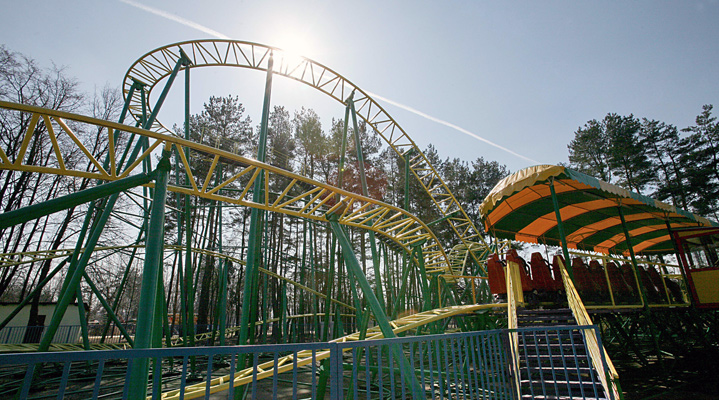 The park was opened on the site of the Komarovsky Forest in 1932. The forest belonged to the Radziwill family till the 18th century, after that it was the property of the Vankovich family. In 1934 the park was renamed to honor the famous expedition of the Soviet steamship Chelyuskin through the Northern Maritime Route from Murmansk to Vladivostok. The BSSR’s first roller-coaster was installed here.
The park was opened on the site of the Komarovsky Forest in 1932. The forest belonged to the Radziwill family till the 18th century, after that it was the property of the Vankovich family. In 1934 the park was renamed to honor the famous expedition of the Soviet steamship Chelyuskin through the Northern Maritime Route from Murmansk to Vladivostok. The BSSR’s first roller-coaster was installed here.
Сentral Botanical Garden
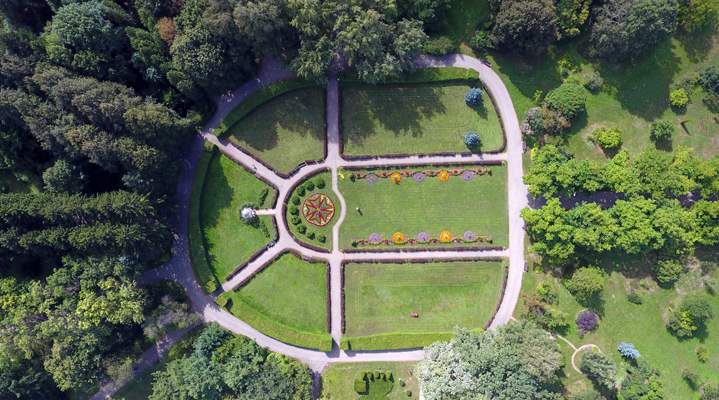 Close to the Chelyuskintsev Park is one of Europe’s biggest botanical gardens with the total area of 153 hectares and a flora collection of more than 10,000 species. Here, one can see an open-air display of live plants, a world of tropics even in the coldest months of the year, enjoy exotic plants, take a walk along a picturesque lake with swans, and enjoy a photo shoot.
Close to the Chelyuskintsev Park is one of Europe’s biggest botanical gardens with the total area of 153 hectares and a flora collection of more than 10,000 species. Here, one can see an open-air display of live plants, a world of tropics even in the coldest months of the year, enjoy exotic plants, take a walk along a picturesque lake with swans, and enjoy a photo shoot.
Loshitsa Park
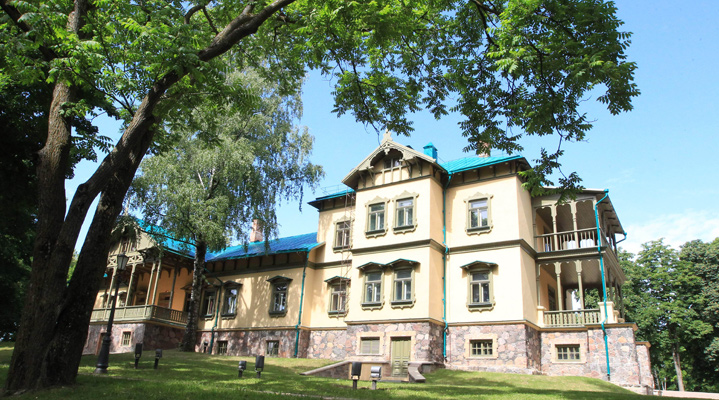 Take time to go on a journey around the Loshitsa Park to explore its ancient museum-estate, remains of a chapel, an amphitheater, a square of clocks, picturesque alleys where one can find an “engagement oak” that fulfills wishes, and orchards where Manchu apricots once grew.
Take time to go on a journey around the Loshitsa Park to explore its ancient museum-estate, remains of a chapel, an amphitheater, a square of clocks, picturesque alleys where one can find an “engagement oak” that fulfills wishes, and orchards where Manchu apricots once grew.
Victory Park (Pobedy Park)
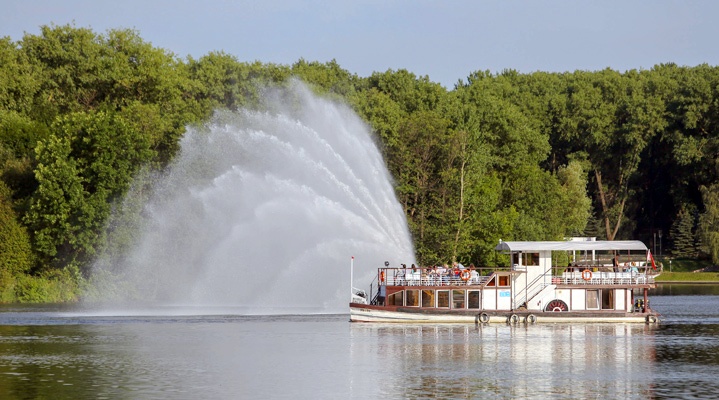 The recreation zone near Lake Komsomolskoye is one of the most favorite getaway spots for Minsk residents and visitors. The mysterious Isle of Birds, which is home to a great variety of birds, is the main attraction of the park. The Victory Park has everything for outdoor activities: bike paths, workout grounds, sports equipment rentals (including boats and catamarans), and a comfortable beach.
The recreation zone near Lake Komsomolskoye is one of the most favorite getaway spots for Minsk residents and visitors. The mysterious Isle of Birds, which is home to a great variety of birds, is the main attraction of the park. The Victory Park has everything for outdoor activities: bike paths, workout grounds, sports equipment rentals (including boats and catamarans), and a comfortable beach.
Drozdy Water Reservoir
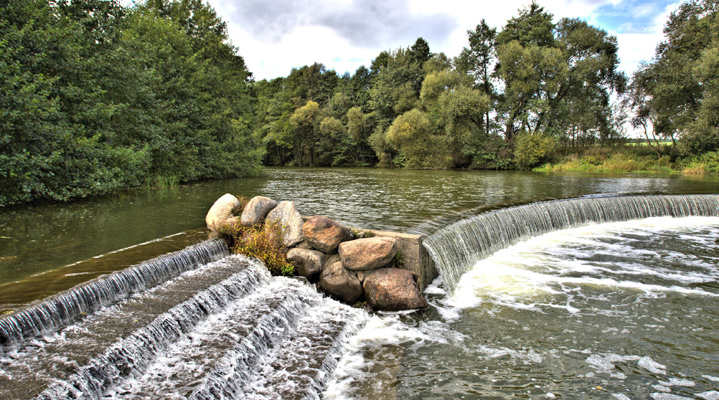 The Drozdy water reservoir is a perfect place for a picnic, a beach party, solitary strolls and wildlife photography.
The Drozdy water reservoir is a perfect place for a picnic, a beach party, solitary strolls and wildlife photography.
RELIGION
Churches of Minsk
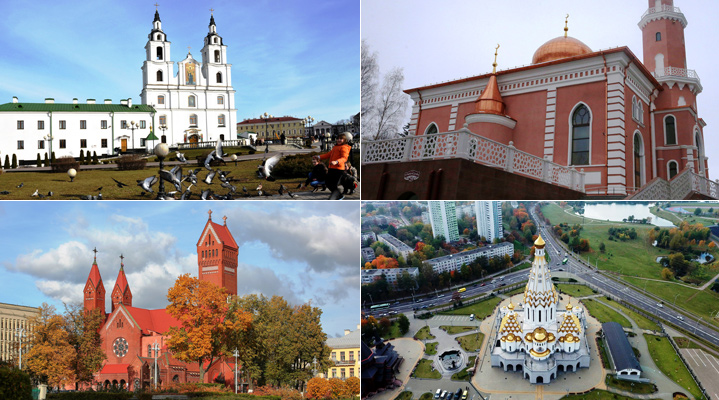 Belarus is a multi-confessional country. The Belarusian capital is home to temples of different religions and denominations: Orthodox, Catholic, Protestant, Jewish, Muslim. Among the most famous are both old and new:
Belarus is a multi-confessional country. The Belarusian capital is home to temples of different religions and denominations: Orthodox, Catholic, Protestant, Jewish, Muslim. Among the most famous are both old and new:
-
Holy Spirit Cathedral in the Upper Town - the main Orthodox church of Minsk;
-
Sts Peter and Paul’s Cathedral - the city’s oldest church;
-
Memorial Church of All Saints consecrated by Patriarch Kirill of Moscow and All Russia not long ago;
-
Cathedral of Saint Virgin Mary (once a church of the Jesuit monastery) - the main Catholic church of Minsk;
-
Red Church, built by aristocrat Edward Woynillowicz in memory of his two deceased children Simon and Helena;
-
Cathedral Mosque, the biggest Muslim church in the country. Its opening was attended by Turkish President Recep Tayyip Erdogan;
-
Synagogue of the Minsk Jewish Community.
SPORT
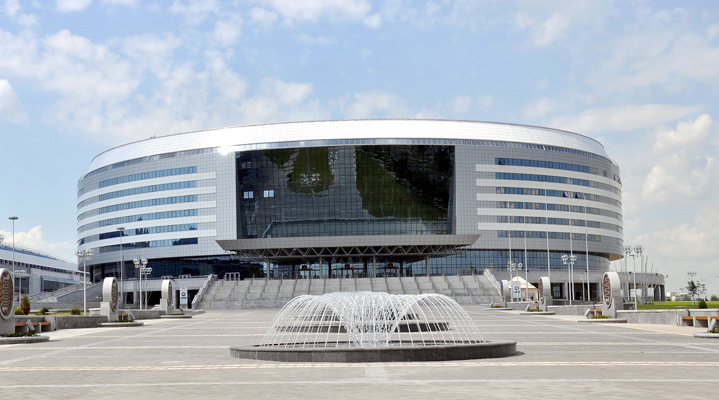 Minsk has hosted a big number of large international competitions and continues to strengthen its status as one of the world’s most sport-loving cities. The legendary Dinamo Stadium was the venue of the football tournament during the 1980 Olympics. Minsk Arena and Chizhovka Arena hosted the 2014 IIHF World Championship. In 2019, Minsk’s leading sports facilities will play host to the 2nd European Games.
Minsk has hosted a big number of large international competitions and continues to strengthen its status as one of the world’s most sport-loving cities. The legendary Dinamo Stadium was the venue of the football tournament during the 1980 Olympics. Minsk Arena and Chizhovka Arena hosted the 2014 IIHF World Championship. In 2019, Minsk’s leading sports facilities will play host to the 2nd European Games.
SHOPPING
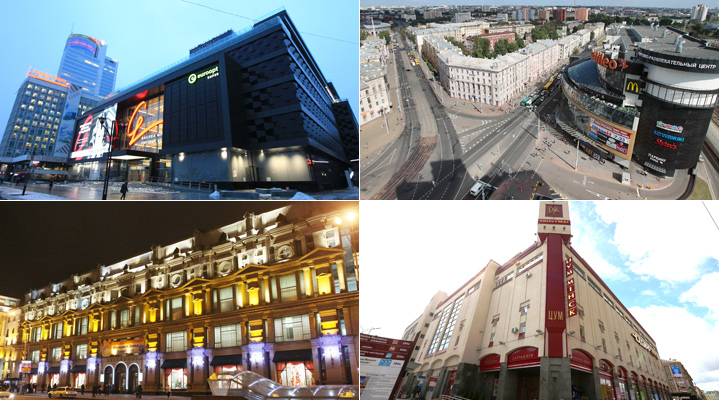 The Belarusian capital has all kinds of shopping outlets: starting from the pioneers of the Minsk trading system such as GUM and TsUM department stores and Minskers’ favorite marketplace Komarovka (the site of the former same-name village that belonged to the Radziwill family till 1812) to modern shopping malls featuring brand stores, food courts, cinemas, ice rinks and entertainment centers.
The Belarusian capital has all kinds of shopping outlets: starting from the pioneers of the Minsk trading system such as GUM and TsUM department stores and Minskers’ favorite marketplace Komarovka (the site of the former same-name village that belonged to the Radziwill family till 1812) to modern shopping malls featuring brand stores, food courts, cinemas, ice rinks and entertainment centers.



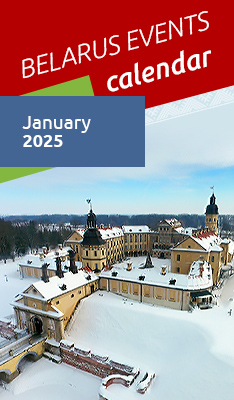




 send friend
send friend print version
print version make home page
make home page add to bookmarks
add to bookmarks
